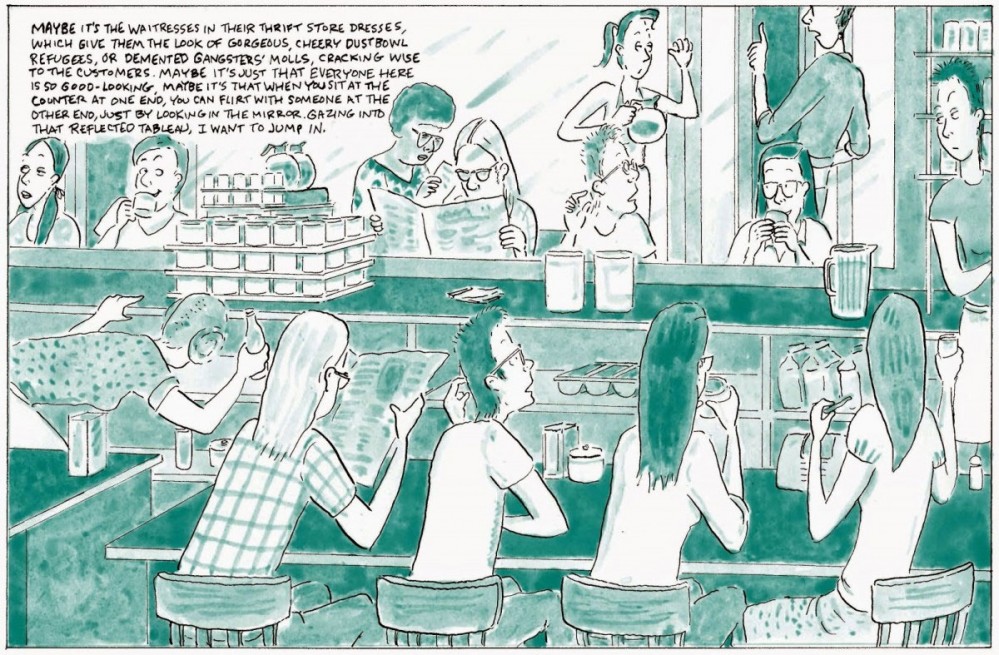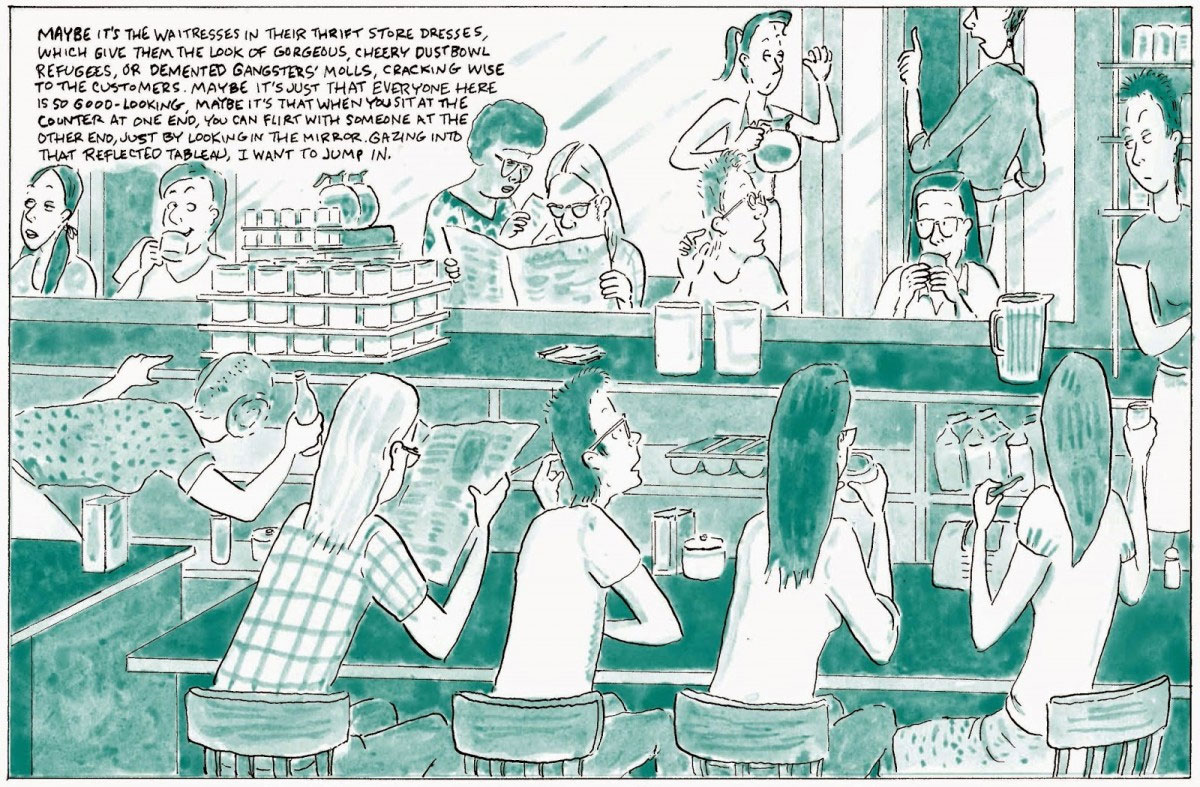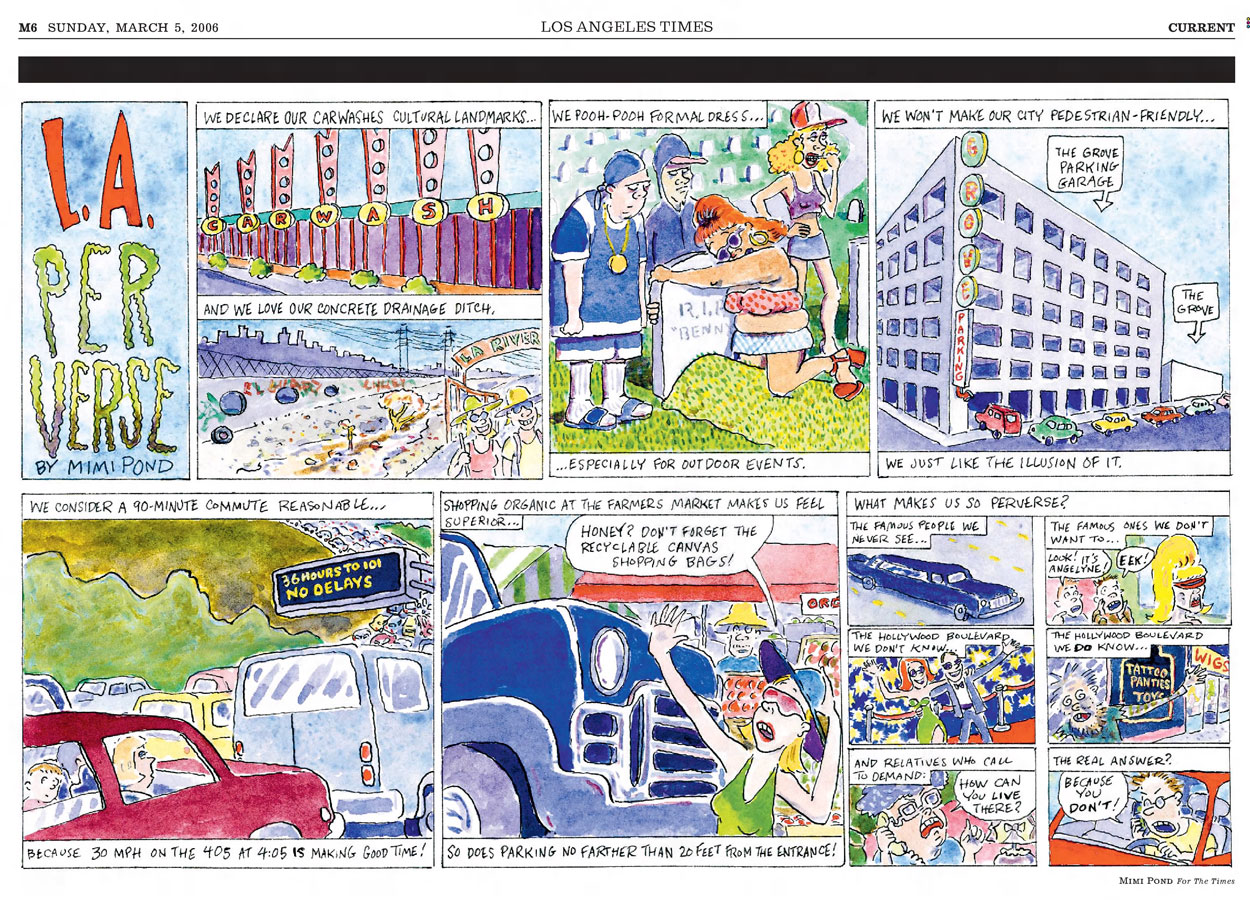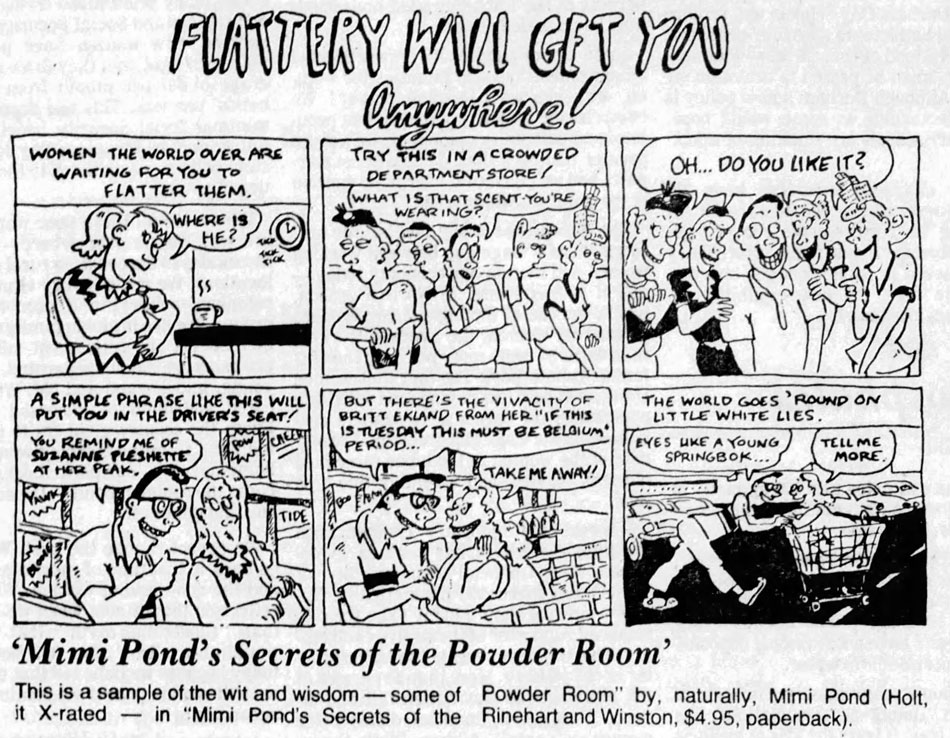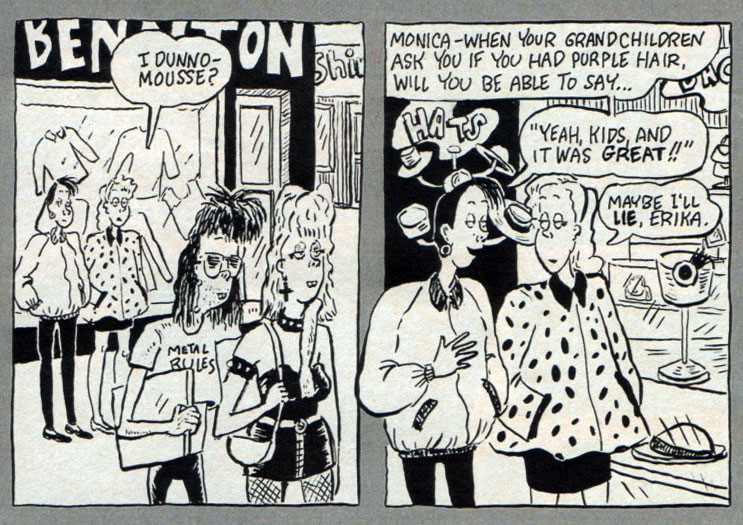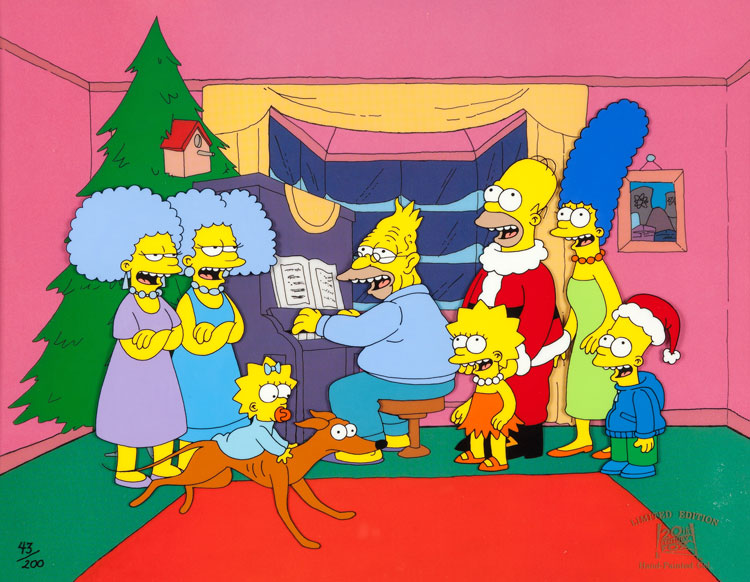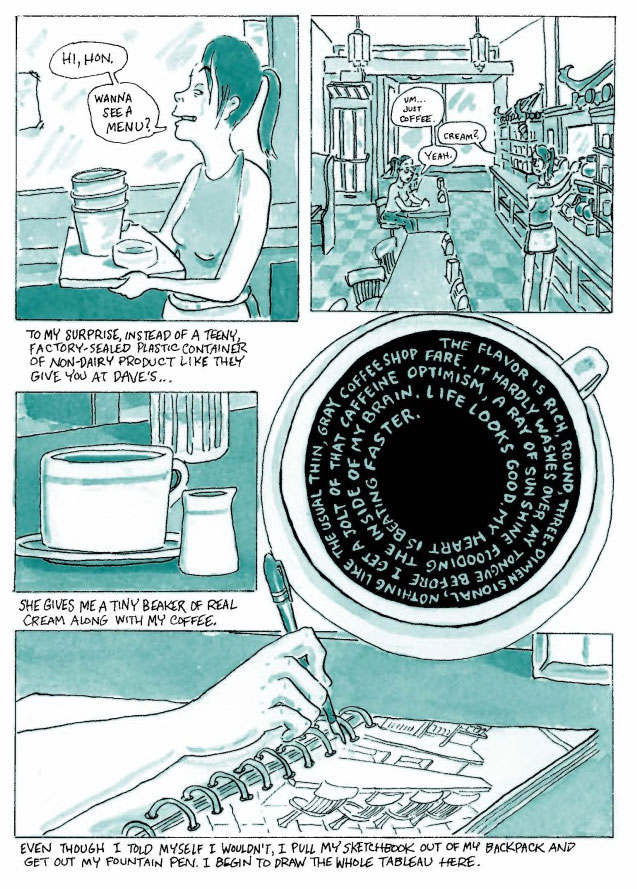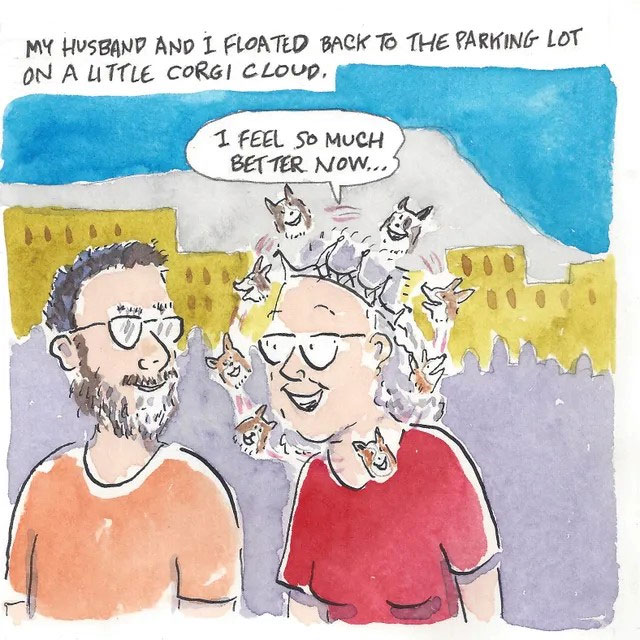'Over Easy'. Mimi Pond can be recognized as the bespectacled woman in the lower center, looking at the mirror, where a waiter and another person have an argument.
Mimi Pond is an American cartoonist, fiction writer, TV scriptwriter and graphic novelist. She first gained fame as the author of 'The Valley Girls' Guide to Life' (Dell, 1982), a young adult book inspired by the "valley girl" subculture, unintentionally created by Frank Zappa's 1982 novelty single of the same name. Throughout the rest of the decade, Pond received more commissions to write books, columns and articles aimed at young females. Among them the gag comic 'Mimi's Page' in Seventeen Magazine and 'Famous Waitress School' for Tables. Pond also received enduring notability as the scriptwriter of the 1989 pilot episode of Matt Groening's 'The Simpsons', 'Simpsons Roasting On An Open Fire'. After a two-decade-long hiatus to focus on her family, Pond returned to making short humorous, autobiographical comics in the 2000s and 2010s. She also drew the well-received graphic novels 'Over Easy' (2014) and The Customer Is Always Wrong' (2017), partially based on her experiences as a waitress in Oakland at the turn of the 1970s into the 1980s.
'L.A. Per Verse' (The Los Angeles Times, 5 March 2006).
Early life and influences
Mimi Pond was born in 1956 in San Diego, California. Her father was an amateur cartoonist, who taught her how to draw. Among Pond's earliest graphic influences were Mad Magazine (especially Harvey Kurtzman and Al Jaffee) and Charles M. Schulz. As a young teen, she also dug Archie Comics, because she hoped her own adolescence would be similar. Pond: "It turned out to be a crushing disappointment. There was no Pop's Soda Shop! I didn't get to date a guy with hash marks on the side of his head. More importantly, there was no Jughead!". In the field of illustration, she draws inspiration from Aubrey Beardsley, Louise Fitzhugh, Hilary Knight and Dr. Seuss, while one of her favorite painters is Henri de Toulouse-Lautrec. She is also fond of editorial cartoonists like Charles Addams, George Booth and Gary Larson. As a young adult, she became inspired by underground comix artists like Peter Bagge, Charles Burns, Robert Crumb, Joyce Farmer, Aline Kominsky and Art Spiegelman. Pond has also expressed admiration for autobiographical comic artists and graphic novelists like Derf Backderf, Lynda Barry, M.K. Brown, Leela Corman, Vanessa Davis, Emil Ferris and Lauren Weinstein. Outside of the USA, she has enjoyed the work of Thi Bui, Guy Delisle, Miriam Katin, Rutu Modan, Joe Ollman, Marjane Satrapi, Seth and Judith Vanistendael. In terms of comedy, Pond finds inspiration in the female comedians Tina Fey and Amy Poehler.
In a live panel, Pond once told her audience: "Seeing original drawings of anyone's work that I admire for me is like a religious experience because there is something about seeing real marks on a real piece of paper in front of your eyes. It's almost like you're meeting the artist yourself. It's like making a connection."
Between 1975 and 1978, Pond studied at the California School of Arts and Crafts in Oakland, California, but never graduated. Her career took off in 1981, when she met National Lampoon editor Shary Flenniken, whom she considers her mentor. Flenniken was the first to buy her cartoons and let Pond stay at her apartment. She sold her first comics to National Lampoon and The Village Voice, while working as a waitress. In 1982, she moved to East 14th Street in Manhattan, New York City. However, she ran out of money and didn't have a back-up plan on what to do next.
Teaser from 'Secrets of the Powder Room', published in The News and Observer of 18 September 1983.
'The Valley Girl's Guide Of Life' and other young adult books
Pond's salvation came from an unexpected corner. In 1982, avant-garde rock artist Frank Zappa released the novelty song 'Valley Girl', with vocals by his daughter Moon Unit. The song is a satirical attack on a specific kind of young L.A. woman from the San Fernando Valley. Characterized by a rather imbecilic sounding accent, much of the stereotypes attached to them are comparable to those attributed to "dumb blondes." Much to Zappa's surprise, 'Valley Girl' became a huge hit in the USA, even his highest-charting single ever. Zappa himself wasn't entirely happy with this result, since it gave people the wrong impression what his experimental music was all about. Things became even worse when advertisers jumped on the bandwagon and turned it into a trend. Soon, many impressionable girls actually started imitating and embracing the "Valley Girl speak".
By the time the trend spread, Pond was contacted by Dell Books to make an illustrated book for this demographic. She took the offer, despite not having heard Zappa's song yet, and bought the single, despite not even having a record player. While Zappa's 'Valley Girl' was intended satirically, Pond decided to treat her subject with light-weight humor, yet still taking the subject matter seriously. As research for her upcoming book, Pond traveled back to Los Angeles, where she intermingled with teenage girls and wrote down their behavior, interests and thoughts. The resulting book, 'The Valley Girls' Guide to Life' (November 1982), became a bestseller and launched Pond's career. While written in an ironic fashion, the tone of Pond's book was serious enough that her target audience found it funny and recognizable. By 1984, Hollywood released a 'Valley Girl' romantic movie, starring Nicolas Cage in his debut role. As such, Pond could profit from the "Valley Girl" cultural phenomenon for quite a while.
After her breakthrough debut, Mimi Pond wrote and illustrated several other humor books for young adults, including 'Secrets of the Powder Room' (Holt, Rinehart and Winston, 1983), 'Shoes Never Lie' (Berkley Books, 1985), 'A Groom of One's Own' (Dutton, 1991) and 'Splitting Hairs' (Simon and Schuster, 1998).
Magazine work
During the 1980s, Mimi Pond's work was also published in magazines like The Village Voice, Adweek, Seventeen, Glamour, Redbook, Manhattan Inc. and The New York Times. From the mid- to late 1980s, she drew a comic strip for the girls' magazine Seventeen, titled 'Mimi's Page'. The one-page gag comic revolves around the young women Monika (with blond hair) and Erika (with black hair). For the restaurant industry magazine Tables, she drew another gag comic, 'Famous Waitress School', inspired by her own past as a waitress.
TV scriptwriting
Besides print media, Pond also wrote scripts for TV series, including 'Designing Women' (1986-1993), 'Pee-wee's Playhouse' (1986-1990) and the pilot episode of Matt Groening's 'The Simpsons', 'Simpsons Roasting On An Open Fire' (1989). At the time, 'The Simpsons' were still 15-second animated shorts used as commercial break bumpers in the sketch comedy show 'The Tracey Ullman Show'. Having gained popularity with viewers, a 'Simpsons' animated series was greenlighted by FOX. Yet, it was considered a serious commercial risk, since prime time animated TV shows hadn't been popular since Hanna-Barbera's 'The Flintstones'. To win a new audience, various episodes were written, so one of them could be chosen as the pilot. Pond knew Groening through her husband Wayne White, who collaborated with Groening's good friend Gary Panter on 'Pee-wee's Playhouse'. She was one of the few people in Groening's circle of cartoonist friends who agreed to script an episode. Since Pond never liked Christmas, she wrote an episode lampooning the holiday season, focusing on family patriarch Homer Simpson. Having not received his Christmas bonus this year, Homer has to work incognito as a shopping store Santa Claus. He eventually bets all his money at the dog races, hoping a dog with the name Santa's Little Helper will win.
Cell from 'Simpsons Roasting On An Open Fire'. Artwork by an unknown 'Simpsons' animator.
Much to Pond's surprise, her script was selected for the pilot episode. All the other scripts were still in production and revision. Her story was suitable for the day of the premiere, 25 December 1989. While 'Simpsons Roasting On An Open Fire' kicked off the seemingly never-ending run of 'The Simpsons', Pond never wrote another episode again. Interviewed by Rob Staeger for The Village Voice (12 May 2014), she reacted that she never received a proper explanation why she wasn't invited back, but assumed it had something to do with the fact that the writing staff was basically "a boy's club". Nevertheless, when Groening wrote a personal list of his Favorite People, who "made his doodles what they are today" (printed in Simpsons Comics, April 1998), he included both Mimi Pond and Wayne White. On 21 August 2014, showrunner Al Jean stated on Twitter that if the final episode of 'The Simpsons' ever comes about, it would be fitting to end it how the pilot episode started: with the family driving off to the Christmas pageant at Bart and Lisa's school.
L.A. staycation at Super King Market (24 August 2008).
Return to comics
At the end of the 1980s, Pond discontinued her comic career in order to focus on her family. For the next 20 years, she rarely created any new comics and cartoons. In the late 2000s and early 2010s, Pond's productivity accelerated again when she got a regular cartoon spot in the Los Angeles Times, commenting on the local news and capturing personal experiences in the city. For instance, her 25 May 2013 episode 'A Squeak From the Void' was based on a trip she and a couple of friends undertook to visit a "hamster show" in Griffith Park, which turned out to be an underwhelming and depressing one-woman lecture about hamsters. In 'Dog Day Afternoon: Judging a Corgi Parade' (6 November 2016), Pond visualizes a funny dog show she had to judge. Her most celebrated comic from this decade was 'When the Menopausal Carnival Comes To Town' (2017), in 2020 included in the anthology 'Menopause: A Comic Treatment' (Penn State University Press). The story follows a mother and her daughter visiting a carnival with satirical rides like the "Hormone Scrambler", "Mood Swing" and a freak show, viciously titled "The Woman Who Asked for a Raise and Got It".
'The Customer Is Always Wrong'.
Graphic novels
In April 2014, Drawn & Quarterly released Pond's graphic novel 'Over Easy', in which she looked back at her time in the late 1970s and early 1980s as a waitress in Mama's Royal Cafe in Oakland, California. Pond always wanted to adapt this period into a graphic novel, since her colleagues were "so complex and her restaurant was so visually rich that it was like a character, it just begged to be told." She first tried to write it as a fictionalized memoir, but her agent couldn't sell this concept. When she was in Hollywood, she also considered adapting it into a screenplay. But given that so many Hollywood screenplays end up never getting produced or, even worse, change stories completely, she decided it would be better to turn it into her first love: a comic strip. Since Pond had to raise children, it took her several years to work on the book.
The book is not autobiographical, but does make use of personal memories and anecdotes, told in drawings with blue-green spot colors. Far from giving a romantic view of the past but still using a healthy dose of humor, Pond's graphic novel portrays her former profession as a stressful, underpaid job, while drugs, sex, hippies and punk rock are never far away. The sequel, 'The Customer Is Always Wrong' (Drawn & Quartely, 2017), continues the waitress' adventures, now working at the Imperial Café. Compared with 'Over Easy', which already was a 270-page doorstopper, 'The Customer Is Always Wrong' is even bigger in scale: over 400 pages long. Interviewed by Hillary Brown for Paste Magazine (22 August 2017), Pond explained that she had more time to work on the sequel, because her children had now grown up and moved out. Much to her luck, a friend of hers had taken photographs during her waitress days, which were a handy reference guide. Both 'Over Easy' and 'The Customer Is Always Wrong' received good reviews.
In 2020, Pond started working on her next graphic novel project, of which she has regularly posted new pages online. Titled, 'Do Admit: Making Sense of the Mitford Sisters', it delves into a lifelong fascination she has for the Mitford Sisters, British aristocrats, who in the 1930s had a close friendship with Adolf Hitler. Since her childhood, it has perplexed her that such independent, close-knit siblings could be so blind to Hitler's Nazi ideology.
Recognition
In 2014, Mimi Pond's 'Over Easy' won an Inkpot Award and on 26 August of that same year, the Pen Center USA Award for "Graphic Literature: Outstanding Body of Work". Her comic 'When the Menopausal Carnival Comes to Town' won a 2021 Eisner Award for "Best Short Story".
Family in arts
Mimi Pond is married to the painter Wayne White, with whom she moved to Los Angeles. Their children, Woodrow White (1992) and Lulu White (1995), are both artists as well. The entire family was featured in Neil Berkeley's 2012 documentary film about Wayne White, 'Beauty Is Embarrassing'.
'Dog Day Afternoon: Judging a Corgi Parade' (6 November 2016).


